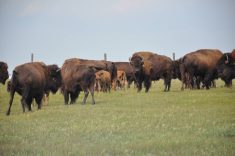SASKATOON – The lack of AgriRecovery money for cattle producers who were flooded out last year continues to cause concern in Saskatchewan.
However, Canadian Cattlemen’s Association president Travis Toews warned producers not to let other issues slide as a result.
He told the recent Saskatchewan Beef Industry Conference that a firmer definition of a disaster must be established and it must be implemented in a more timely way.
However, he said producers shouldn’t make decisions on whether or not they are going to get a payment.
Read Also

Trump’s tariffs take their toll on U.S. producers
U.S. farmers say Trump’s tariffs have been devastating for growers in that country.
“We really need a program that’s more transparent,” he said. “We also need to make sure this program does not become a preoccupation.”
Otherwise, the “real work” on issues such as market access won’t get done, he said.
“The federal government will lose interest in us and we will eventually bleed the treasury down to where we don’t have money (for other things),” Toews said.
The provincial government announced feed freight assistance and a pasture reseeding program last fall. At the time, agriculture minister Bob Bjornerud said he hoped Ottawa would put in its 60 percent share.
That hasn’t happened.
Bjornerud told reporters Jan. 21 that he continued to raise the issue with federal agriculture minister Gerry Ritz and hoped to hear an answer soon.
He will also raise it at a federal-provincial meeting scheduled for Toronto Feb. 11.
Randy Hoback, a Saskatchewan Conservative MP from Prince Albert, said the federal government has introduced a tax deferral program for producers who have to reduce their breeding herds but couldn’t say whether an AgriRecovery payment is coming.
A package for Manitoba farmers was announced just before Christmas, but Hoback said the difference between the two provinces is that Manitoba has had flooding for four years.
“We are assessing the numbers that the province has given us now,” Hoback said of Saskatchewan’s request.















